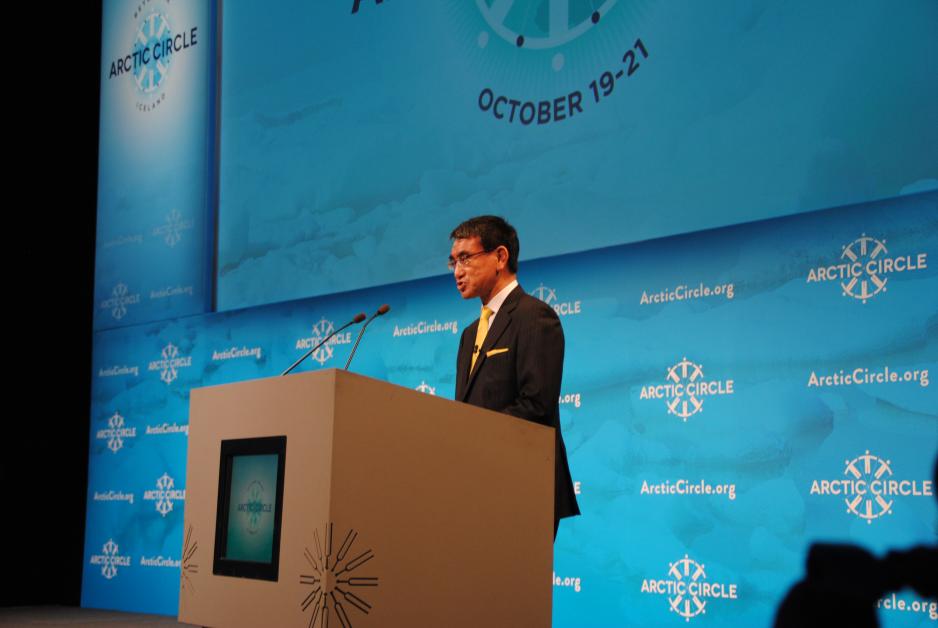Japan is Entering The Arctic Energy Sector

The Japanese Minister of Foreign Affairs, Taro Kono, told The Arctic Circle Assembly that Japan is heading for the Arctic energy marked - assosiated with Russian giant Novatek. (Photo: Arne F. Finne).
Japan's oil and gas industry is entering the Arctic sector through cooperation with Russian Novatek at Yamal.
Japan's oil and gas industry is entering the Arctic sector through cooperation with Russian Novatek at Yamal.
The Japanese Minister of Foreign Affairs, Mr. Taro Kono, underlined his country’s great interests for the Arctic during Friday’s opening session of the Arctic Circle Assembly at Reykjavik, Iceland.
Mr. Kono is the first Minister of Foreign Affairs from Japan visiting this annual conference, and he was eager to establish an understanding of Japan's Arctic engagement.
Involved for decades
In addition to scientific research, which Japan has been involved with in the Arctic for decades, the Japanese are also concerned with sustainability, applying the results of its scientific research programs."Maritime research is crucial to understanding the Arctic environmental change mechanism, and with this in mind, the government of Japan is considering building a new icebreaker for the Arctic research as a new international Arctic research platform", Mr. Kono said, also announcing a joint data comparing project with Finland on black carbon, to be launched in the near future.
We are promoting a comprehensive energy development cooperation with Russia.
Cooperation with Russian Novatek
Foreign Minister Taro Kono also brought another eye-opener to the audience in Reykjavik Friday, as he spoke about a new Russian-Japanese corporation on energy development.
"We are promoting a comprehensive energy development cooperation with Russia in its Arctic region, while fully taking account of the environment. We welcome the fact that that Japan Oil, Gas and Metals National Corporation – JOGMET – and Novatek (one of the largest independent natural gas producers in Russia – editors’ note) signed a memorandum of understanding last month."
Explore the opportunities
They intend to explore opportunities for coorporation on Novatek´s project in Yamal and the Gydan peninsulas, including the Arctic LNG 2 project, the Japanese Foreign Minister said.
A press release from Novatek in September stated that a Memorandum of Understanding (MOU) was signed following a meeting between Russian President Vladimir Putin and the Prime Minister of Japan, Shinzo Abe.
"According to the MOU, the parties agreed to explore opportunities to cooperate on Novatek’s projects in the Yamal and Gydan peninsulas, including the Arctic LNG 2 project, on developing a regular transport link via the Northern Sea Route for LNG deliveries to the Japanese and Asia-Pacific markets, as well as exploring LNG marketing opportunities in the Asia-Pacific region", the press release said.
Global LNG markets
Novatek’s Chairman of the Management Board, Leonid Mikhelson, noted that;
"We welcome the expression of interest from international partners to our LNG projects in the Yamal and Gydan peninsulas. Our prolific hydrocarbon resource base, combined with our experience in implementing large-scale LNG projects and navigating the Northern Sea Route, creates a solid platform for mutually beneficial cooperation. Japan is one of the most significant global LNG markets, and we expect further expansion of cooperation in this area which will facilitate the development of trade and economic relations between our countries."
Data on sea ice and navigation
In Reykjavik, Foreign Minister Taro Kono stressed the fact that increasing ship traffic in the Arctic also is increasing the risk of accidents and Arctic pollution, a fact that could cause tremendous environmental damage.
"Data on the status of the sea ice is essential for safe and effective navigation in the Arctic. The National Institute of Polar Research of Japan has been developing vessel navigation unit support system, called VENUS. This system provides an overview of destination-specific information on sea ice and weather conditions in a close to real time manner, covering a 1,000 kilometres radius from any ship that may have access to the Venus system", the Minister concluded in Reykjavik.

